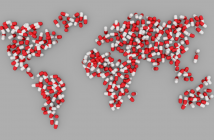The subject of vaccinations and autism is one that divides people and evokes a great deal of heated debate. Do vaccines cause autism? What does the science say? And what does the UK public really believe? In our new study, we canvassed opinion to see how pervasive bad science can be.
Inaccurate or misleading medical information is dangerous. It can stop people getting the medical attention they need, and it can cause someone to act in a way that is far from optimal for their health. As one source states, the “broad dissemination and consumption of false or misleading health information, amplified by the internet, poses risks to public health and problems for both the healthcare enterprise and the government.”
When discussing misleading medical information and health myths in general, there is no better example than that of the link between vaccines and autism. The topic provokes a lot of passion and, in many situations, anger. To understand the public’s perception of vaccines and whether or not they cause autism, the team at Kolabtree conducted a study. This seeks to explore how medical misinformation is spread, how pervasive and dangerous misleading medical information can be and the role the internet plays in the spread of this information.
Do Vaccines Cause Autism?
Before we go on to look further into the reasons behind the study and what it revealed, we feel it’s necessary to discuss the science. Do vaccines cause autism?
The short answer is no. Vaccines don’t cause autism. There has been a recent major population-wide cohort study that has confirmed, yet again, that there is no proven link between autism and the MMR vaccine. But this study is far from an isolated one. Over the years, many reputable studies have been conducted and there is, as of yet, no provable connection between autism and MMR.
In an ideal world, this knowledge would be enough to put a parent’s mind at rest, and yet the MMR-autism link continues to endure and studies continue to be carried out, eating up valuable research time and funding that could be used to make advances in autism. But why is this connection still so pervasive? Where did this health myth come from in the first place?
Why Do People Believe Vaccines Cause Autism?
This medical myth was born in 1997 following the publication of a study by British surgeon Andrew Wakefield. The article was published in The Lancet, a prestigious medical journal, and suggested that the Measles, Mumps and Rubella (MMR) vaccine was increasing the occurrence of autism in British children.
The study in question involved eight children. This is remarkable when we consider the fallout that would eventually happen, and it highlights the importance of safeguarding the public from false medical information. The study was immediately refuted and discredited due to serious procedural errors, ethical violations and undisclosed financial conflicts of interest. The paper was retracted from The Lancet and Wakefield lost his medical license.
Unfortunately, the damage was done. Terrified parents had heard the news and had begun to delay, or outright refuse, the vaccination for their children. Vaccine uptake in Britain plummeted. Even today, the number of paediatricians reporting vaccine refusals has increased significantly. Since the paper published in The Lancet, rumours have run rampant and misinformation has been spread and amplified by the internet.
Why We Conducted This Study
With this study, we wanted to get an accurate reflection of people’s attitudes towards this health myth. Concern over the MMR jab seems particularly pertinent today, given that the UK has recently lost its ‘Measles-Free’ status with the World Health Organisation (WHO), three years after the virus was eliminated in the UK. Today, only 87.2% of British children have their second dose of the jab, down from 88.6% in 2014-2015. There have been 231 confirmed cases of measles in the UK in the first quarter of 2019.
As medical experts and researchers, we wanted to explore whether people really believe that vaccines cause autism and examine whether or not, in the age of social media, the public is more easily misled by medical misinformation. Finally, we wanted to discover whether or not the Medic Update has had a significant impact on the number of people viewing, and being influenced by, inaccurate medical information regarding vaccines.
Below, we discuss the questions we asked the public and the responses that were provided.
1. Do You Believe Vaccines Cause Autism?

The results of this question are fairly comforting. Of our sample size, it appears that the majority of people firmly believe there to be no connection between the MMR vaccine and autism.
When looking at the difference between the views of men and women, there is a slight but insignificant difference. More women (66.5%) than men (63.9%) answered that they don’t believe in any causal relationship.
According to our research, the age group that is most likely to believe that vaccines cause autism are those aged 35-44 (11%). In this group, 16% of men said they believed vaccines cause autism compared to only 4.7% of women. However, women tend to be more uncertain. Of this age group. 32.3% of women said that they aren’t sure about the relationship — compared to just 15% of men.
What is slightly concerning about this data is the number of people who are undecided about the relationship between vaccines and autism. Despite the studies and facts available, some people have room for doubt. In fact, if you add up those who believe that there is a connection between autism and vaccines and those who are uncertain, we can see that 34.7% of the population has been negatively impacted by false medical information.
2. Do You Believe the Dangers of Vaccinations Outweigh the Benefits?
 As we can see, 62.6% of people believe that the dangers of vaccinations don’t outweigh the benefits. However, 16.5% of people believe the dangers are too much of a risk, while 21% are uncertain.
As we can see, 62.6% of people believe that the dangers of vaccinations don’t outweigh the benefits. However, 16.5% of people believe the dangers are too much of a risk, while 21% are uncertain.
Incredibly, while only 12.4% of women said they believe the dangers of vaccinations outweigh the benefits offered, a notable 20.6% of the men in our survey said they believe the dangers outweighed the benefits.
Those aged 65+ are the most inclined to believe that vaccinations are more dangerous than beneficial (29.5%). When we compare this to the 7.8% of 25-34 year-olds who believe the same, we can clearly state that the younger the generation, the more comfortable the participants were with the safety of vaccines.
3. Have You Personally Seen Any Anti-Vaccine Content on One or More of the Following Platforms?
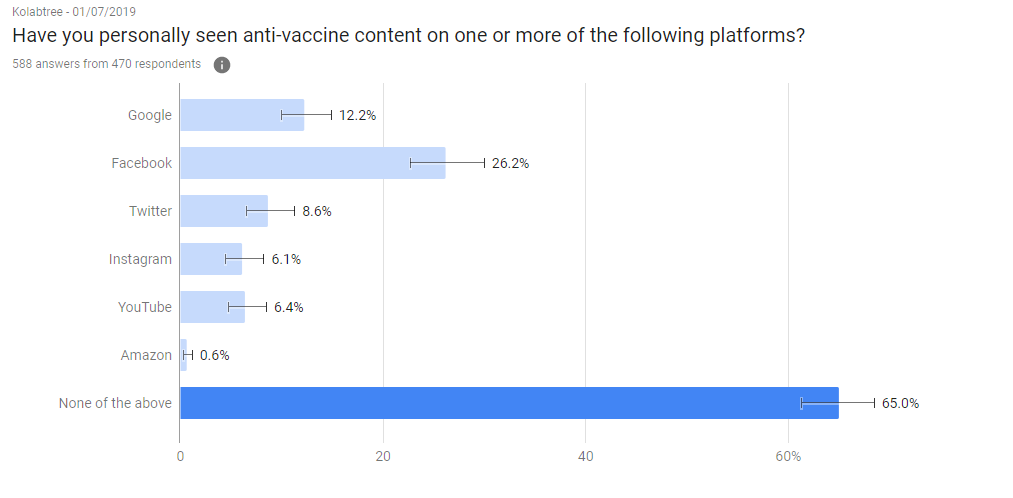
Our results revealed that, on the whole, people aren’t seeing much anti-vax material on social media but when they do, it’s predominantly on Facebook.
Our results also showed that more young people (particularly those aged 18-24) have seen anti-vaccine content on social media. This is likely because they are spending more time on these platforms. Those who have seen the least amount of content on these platforms are aged 65+.
4. Do You Think the Post Below Is a Credible Source of Information about Vaccines?

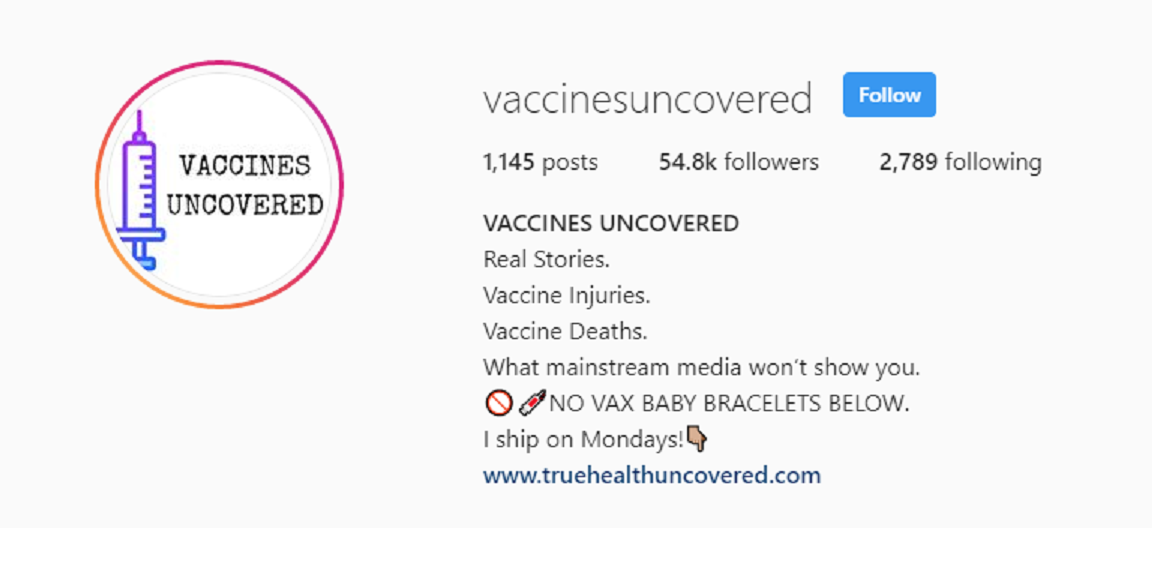
The majority of our participants were distrustful of this social media account, with 90.9% saying that it isn’t a credible source of information. Only 9.1% believe it to be trustworthy.
While both men and women overwhelmingly think this is a poor source of information, more women (94.2%) than men (87.2%) believe this to be the case.
5. Do You Think That the Account in the Picture Below Is a Credible Source of Information about Vaccines?

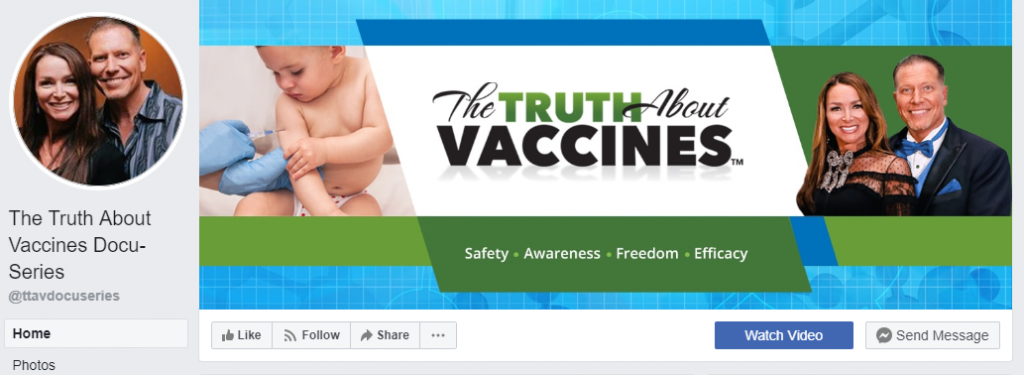
As with the previous question, we can see that most people are critical of anti-vax social media accounts, with 86.5% of people believing that this is not a credible source of information about vaccines, versus just 13.5% who feel it is.
6. Facebook, Google, Amazon and Other Companies Have Pledged to Reduce the Visibility of Anti-Vaccine Information. Do You See Less Anti-Vaccine Content Online Now?
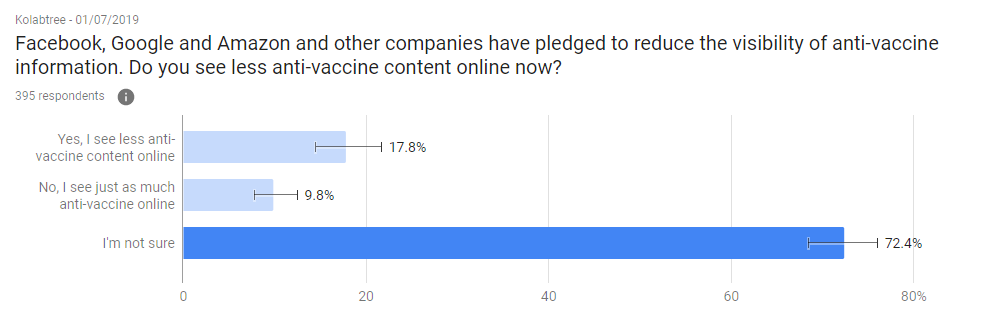
After doctors questioned whether companies like Google, Facebook and Amazon share part of the blame in the rise of children going unvaccinated, these same companies agreed to take steps to limit the spread of this misinformation. It seems that by and large, people are not consciously aware of this change, with 72.4% of people saying they are not sure whether they are seeing more or less content relating to vaccinations and autism. 17.8%, however, have become consciously aware of less anti-vax content on social media, which is a positive first step and promising news for medical information in general.
What We Learned from This Study
Ultimately, this study was reassuring in confirming that most people appear to have a level head when it comes to the science of MMR vaccines and autism. The majority of people don’t believe in the relationship and aren’t swayed by misleading social media accounts. The fact that there are so many people who appear undecided, however, is worrying. It further supports that it is vital that companies such as Google, Facebook and Amazon take measures to prevent people from getting exposed to misleading — and dangerous — medical content.
—
Are you looking for a qualified professional scientist who can help you carry out research studies or verify information? Hire freelance scientists on Kolabtree and rest assured that your project is in capable hands.
—
Find medical jobs from top employers.





